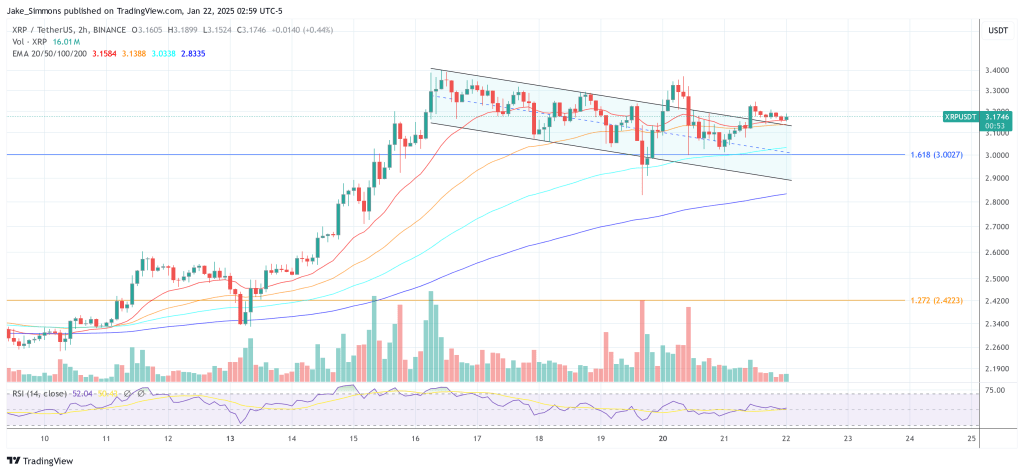Rumors of the US Treasury’s alleged foray onto the XRP Ledger (XRPL) have been circulating, sparking buzz across the digital asset community. On January 21, several community accounts on X claimed that an address linked to “home.treasury.gov” had surfaced on the ledger, creating trustlines with well-known financial institutions such as Bank of America, BlackRock, and JPMorgan.
XRP Scam Alert
However, a deeper look under the hood has uncovered a series of red flags indicating that the wallet in question is neither authentic nor affiliated with the US Treasury. Community member Echo X (@echodatruth), took to X to debunk the rumor through a detailed video breakdown.
In the video, he explained that there are many red flags with the wallet. “If you go XRP Scan and you put in the wallet address, you will notice that they have not only just all of these different tokens from Bank of America, BlackRock, and JP Morgan, which again, that’s already a red flag, but you can notice they have 16,000 XRP that has been deposited into this wallet by people just sending it over to the Treasury. Or what they think is the [Treasury].”
According to Echo X, any user can easily verify these discrepancies by exploring the wallet on XRPL scanners such as XRPScan or Bithomp. He and other developers from BuildX and the ERS team identified an unusual pattern of newly issued “Bank of America,” “BlackRock,” and “JPMorgan” tokens, all minted by the same address—strong indicators that the tokens are not legitimate.
Public data from Bithomp shows that the suspect wallet was activated on January 21 at 3:17 UTC, after which it promptly set its domain to the official US Treasury address, home.treasury.gov—a move observers believe was intended to appear legitimate.
Notably, the wallet received 1 trillion units of each of the so-called “Bank of America,” “BlackRock,” and “JPMorgan” tokens, placed multiple sell orders for tens of millions of these tokens in exchange for XRP and used questionable domain references, including an apparently invalid “BRICS domain.”
Echo X highlighted that users who looked deeper into the provenance of these tokens would discover their suspicious origins. He noted: “Now, if you actually click on it and you see what the Genesis wallets are … it leads you to a BRICS domain wallet. … That BRICS domain is not even a valid domain. Why would the BRICS be creating a wallet?”
Further compounding doubts, data shows the wallet’s trustlines were created around newly issued tokens that hold no official backing. In one notable transaction, the address placed an order to trade 299 million JPMorgan tokens for 33.23 million XRP, at an exchange rate of 0.11 XRP per token, raising more eyebrows about its authenticity.
The rumor gained traction when it appeared on XRPScan that the addresses in question had some form of verification tag—an aspect that typically shows that a wallet has completed a Know Your Customer (KYC) process. However, Wietse Wind, founder of Xaman (formerly Xumm), clarified that verification on XRPScan simply indicates whether the account holders have submitted personal data, not that they represent any particular entity. Wind noted via X:
“The domain field is a public field on an account on the blockchain, anyone can enter anything there. Issued tokens can be issued by anyone. KYC can be done by anyone. … XRPScan shows data that lives on the ledger. This data lives on the ledger. […] They are all in fact KYC’d. By different people, all from the Philippines. So there we have it. KYC helps, but it’s still no guarantee.”
Wind’s remarks underscore that the KYC process is limited to verifying an individual’s identity. It does not confirm that person’s affiliation with an organization, such as the US Treasury or any major bank. Effectively, a user can label a wallet “Treasury,” mint tokens named after financial institutions, and set a domain to a high-profile website without actually representing those entities.
In his video, Echo X urged community members to remain vigilant and avoid sending XRP to questionable addresses simply on the basis of domain labels or speculation: “Again, shout out to the BuildX and ERS community and team and developers … because they’re trying to save you. … Make sure you do your own research and know what you hold.”
At press time, XRP traded at $3.17


















